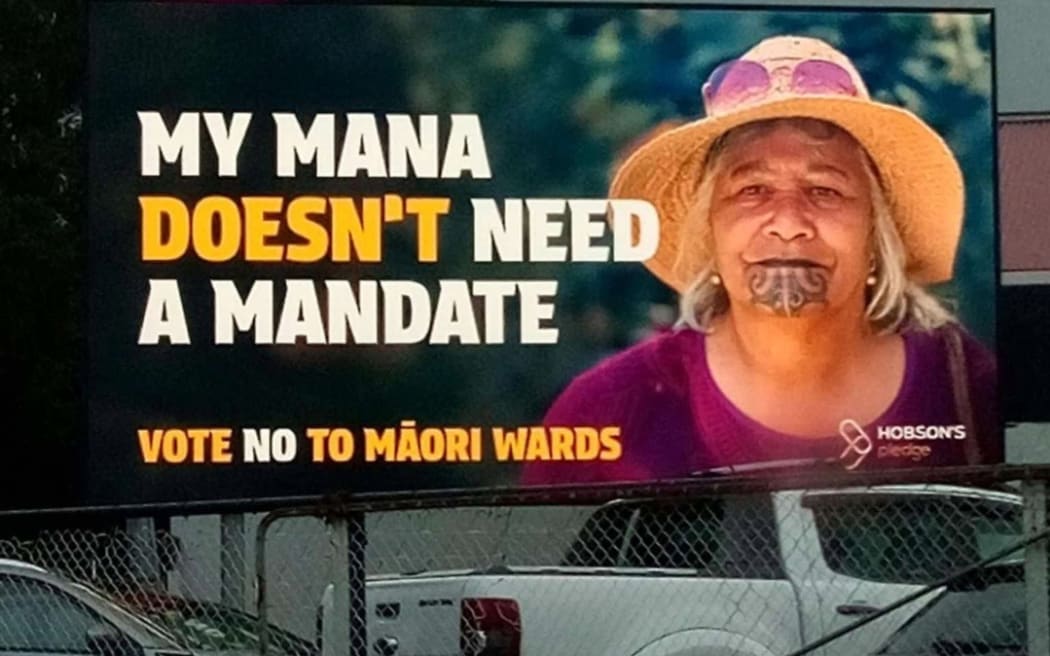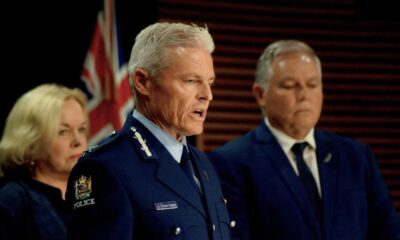Politics
Rotorua Kuia Distressed by Use of Image in Anti-Māori Ward Campaign

A Rotorua kuia, Ellen Tamati, is expressing her profound distress after discovering her image was used without consent in an anti-Māori wards campaign by the group Hobson’s Pledge. The campaign, which featured her likeness on billboards across New Zealand, sparked outrage and prompted over 30 complaints to the Advertising Standards Authority by the morning of March 15, 2024.
Tamati, a member of Ngāti Pikiao, Ngāti Whakaue, Ngāti Rongomai, and Ngāti Tawhaki, learned of the usage of her image early Wednesday morning when she received a call from her mokopuna at 01:40. Speaking with Aukaha News, she expressed her devastation: “I’m lost for words, that’s not me, that is not me.” The billboard prominently displayed her photo alongside the message, “My mana doesn’t need a mandate – vote no to Māori wards,” giving the false impression that these were her words.
Concerns Raised Over Moko Kauae and Cultural Representation
Tamati’s moko kauae, a traditional facial tattoo, holds significant cultural meaning for her. She emphasized that it represents more than just a personal adornment, stating, “This carries everything,” while pointing to her kauae. Her granddaughter, Anahera Parata, expressed anger and hurt over the misuse of her grandmother’s image. “All my life, I have only ever known Nan to be pro-Māori, a very staunch supporter of Te Pāti Māori,” she said. “It’s damaging, not just to Nan but to our whole iwi.”
The billboards have appeared in various locations, including Rotorua, Hamilton, Whangarei, and Christchurch, leading to widespread discussions regarding the ethical implications of using someone’s image in a political campaign without permission.
Hobson’s Pledge Responds to Controversy
The image of Tamati was captured on Waitangi Day this year by photographer Rafael Ben Ari, who operates under the name ChameleonsEye. Hobson’s Pledge acquired the rights to the image from stock photo websites, claiming they believed it was appropriate to use. Group leader Don Brash stated that they thought it “fair to use” the image in public-facing materials. Nonetheless, Tamati has made it clear that no consent was given for its use.
“We simply believe all New Zealanders should have the same political rights and I think a great many Māori agree with that,” said Brash.
Brash indicated that the organization has instructed the removal of the billboards and expressed disappointment that the campaign caused personal distress. He noted that they would be reaching out to Tamati to offer apologies, stating, “I think it is taking place, may have already taken place.” He added that Hobson’s Pledge would continue to engage in discussions around democratic fairness and equal voting rights.
In response to the incident, Tamati called for a direct conversation with Hobson’s Pledge. “Come and see me,” she directed, acknowledging the lasting impact the situation has had on her and her community. “But the damage has been done,” she concluded, highlighting the need for respect and understanding in the representation of Māori culture and identity.
-

 World1 week ago
World1 week agoPrivate Funeral Held for Dean Field and His Three Children
-

 Top Stories2 weeks ago
Top Stories2 weeks agoFuneral Planned for Field Siblings After Tragic House Fire
-

 Sports3 months ago
Sports3 months agoNetball New Zealand Stands Down Dame Noeline Taurua for Series
-

 Entertainment3 months ago
Entertainment3 months agoTributes Pour In for Lachlan Rofe, Reality Star, Dead at 47
-

 Entertainment2 months ago
Entertainment2 months agoNew ‘Maverick’ Chaser Joins Beat the Chasers Season Finale
-

 Sports3 months ago
Sports3 months agoSilver Ferns Legend Laura Langman Criticizes Team’s Attitude
-

 Sports1 month ago
Sports1 month agoEli Katoa Rushed to Hospital After Sideline Incident During Match
-

 World2 weeks ago
World2 weeks agoInvestigation Underway in Tragic Sanson House Fire Involving Family
-

 Politics2 months ago
Politics2 months agoNetball NZ Calls for Respect Amid Dame Taurua’s Standoff
-

 Top Stories2 weeks ago
Top Stories2 weeks agoShock and Grief Follow Tragic Family Deaths in New Zealand
-

 Entertainment3 months ago
Entertainment3 months agoKhloe Kardashian Embraces Innovative Stem Cell Therapy in Mexico
-

 World4 months ago
World4 months agoPolice Arrest Multiple Individuals During Funeral for Zain Taikato-Fox


















